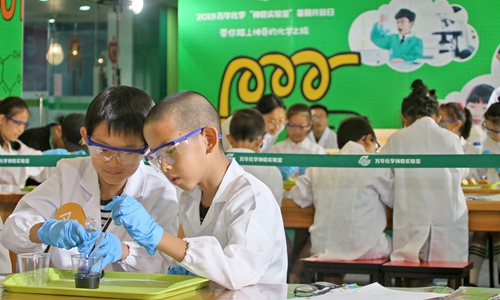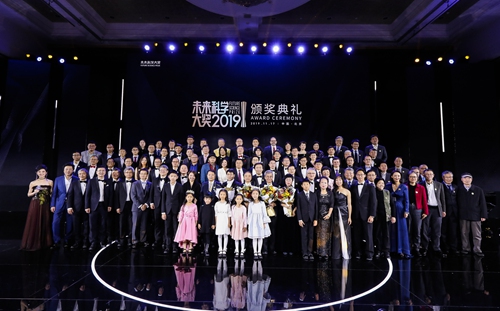HOME >> BUSINESS
‘Useless’ science matters
By Zhang Dan Source:Global Times Published: 2019/11/24 19:48:40
Chinese scientists call on society to attach more importance to basic scientific research

Students perform experiments at a science club in Yantai, East China's Shandong Province in July. Photo: IC

Attendees pose for a photo at the Future Prize award ceremony in Beijing on November 17. Photo: Courtesy of Future Forum
At this year's Future Science Prize award ceremony, China's first nongovernmental prize for innovative basic scientific research was awarded to four scientists who called on more significant basic scientific research on November 17.
Funded by highly respected entrepreneur and investor donors who cherish the value of scientific development, the prize is awarded in three categories with a $1 million purse for each award - namely the Life Science Prize, Physical Science Prize, and Mathematics and Computer Science Prize.
This year's Physical Sciences Prize went to Wang Yifang, head of the Institute for High-Energy Physics and an academician at the Chinese Academy of Sciences, and Kam-Biu Luk, professor at the University of California, Berkeley and senior faculty scientist at Lawrence Berkeley National Laboratory, due to their discovery of a new type of neutrino oscillation.
"To look at the future, when China's GDP becomes number one in the world in 2035 or 2049, we should make great contributions to the areas of literature, arts and pure science, like our ancestors who have made contributions written in the history of mankind," Wang told the Global Times on Thursday. He also said that China is presently still running behind the US in basic scientific research.
In recent years, great scientific achievements in China have made people aware of the significance of basic sciences, such as China's first manned spacecraft, lunar exploration and quantum communication development. However, researches such as particle physics and neutrino in Wang's area are regarded as "useless" science by some people.
'Useless science'
People often ask Wang, "How will your research be applied?"
"If a scientist or an official asks me, I would give an impolite answer: 'no use'." He said that to love the "useless science" is not an easy job.
The public can benefit from useful science, but if the research is purely aimed at gaining knowledge, understanding of a law or sheer basics, people would deem it as useless, he noted.
"China's science has been behind advanced countries in the last 2,000 years. The main reason is that we seldom ask questions that are seemingly useless but quite essential," Wang said, adding that Chinese lack the sheer curiosity, and instead, are driven by utility psychology most of the time.
Shing-Tung Yau, the renowned Chinese-born American mathematician, told FT Chinese in May 2018 that China's efforts into theories are not enough, and without the support of basic sciences and theories, the popular applied sciences have to follow the developments of the US and the EU.
In addition to scientists, influencers in China's business sector voiced to support basic scientific research.
Huawei's founder Ren Zhengfei told Chinese Central Television (CCTV) in January that basic scientific research and education are the two issues that concerned him the most.
According to Ren, Huawei has at least 700 mathematicians, 800 physicians, 120 chemists and 6,000 to 7,000 experts working on basic research, the Science and Technology Daily reported in May.
Tencent Holdings' Chairman and CEO Pony Ma Huateng, who is also a member of the National People's Congress (NPC), submitted a proposal to strengthen the country's basic sciences at the second session of the 13th NPC in March.
Decent scientists
In January 2018, China's State Council issued a document on enhancing the country's basic scientific research comprehensively.
According to the statistics from the National Bureau of Statistics, the Ministry of Technology and the Ministry of Finance, China's research and development (R&D) expenditure in 2018 was 1.97 trillion yuan ($279.9 billion), an 11.8 percent growth compared with 2017.
The expenditure of basic scientific research reached 109.04 billion yuan, and for the first time surpassed 100 billion yuan, accounting for 5.5 percent of the total R&D expenditure.
However, Wang noted the proportion in advanced countries was about 15 percent.
"China's economy grows fast and it is true that investment in basic sciences research has been growing fast in recent years," Lin Jianhua, former president of Peking University, told the Global Times on Friday.
Both Wang and Lin mentioned the inadequate support of basic scientific research from society. Wang said about one-third of the support in developed countries comes from social organizations and enterprises, but in China, it is nearly zero.
Wu Hong, one of the initiators of the Future Forum, told the Global Times that the prize can set an example for other organizations and companies in China to get more people involved in building China's basic scientific research.
In addition to the funds for scientific research, policies for improving the working environment and life of scientists and academics are required, Lin noted. "The life of scientists may not be wealthy, but it should be decent. They shouldn't need to sacrifice their ideals to make a living," Lin said.
"When we emphasize improving China's basic scientific research, we shouldn't forget that it has two missions: one is to have innovative results and the other is to cultivate talents… A country's academic capability can be reflected by how many high-level talents it cultivates," Lin said. He also mentioned that some of China's high-level talents are used to being trained abroad.
Open-minded
With regards to the cooperation between Chinese scientists and American scientists, Wu said award winners Wang and Luk set a very good example.
However, the US scrutinized Chinese scientists by refusing their visas to attend academic conferences in the US, or have investigated their Chinese descent at major academic institutions amid the trade war.
"Although the US has its own considerations according to its national conditions, the limits it put on Chinese scientists shows its narrow view," Wu said.
"When it comes to science, every country should adopt an open and cooperative attitude," she said.
After giving an example of Nobel Prize winner Tu Youyou who discovered the drug artemisinin to treat malaria, Wu asked how it is possible if Tu's research only cures Chinese patients, and not the patients around the world?
Posted in: INDUSTRIES,ECONOMY